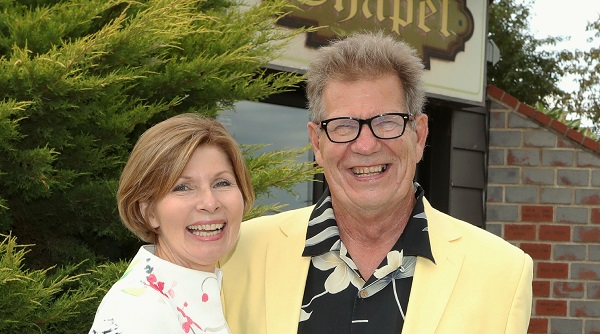Horse racing has brought Steve Erban many rewards since 1972, when he promoted two weekends of racing at the Anoka County Fairgrounds in his first foray into the industry. The greatest came 34 years ago in Hot Springs, Ark., when he was a horse trainer new to town.
His friend Terry Wallace, race caller at Oaklawn, suggested they head downtown to the new Hilton and have a beer. “We were on our side of the bar, and Dorothy came in with her friends for a drink on the other side,” Erban recalled. “Terry knew one of the women, so he went to say hello and introduced me [to Dorothy]. We danced all night. We had a great time that meet.”
Steve and Dorothy married that December, beginning a partnership that led the Erbans to the Canterbury Park Hall of Fame. Steve is the visionary, the grandiose thinker, the promoter. Dorothy makes things happen. Together, those complementary personalities have enhanced Canterbury and the state’s racing industry in a multitude of ways.
Building on the footprint started by Arnie Palmer, the races Steve promoted in Anoka County attracted 2,500 to 3,000 fans each summer. He moved the races to the Washington County Fairgrounds, where he built the racetrack, in 1975. Steve did it all: he was racing secretary, race caller, steward, program designer, ad salesman and cook, making free breakfasts for the horsemen each Sunday morning.
“We developed Minnesota’s longest and richest horserace at the time, The Pepsi Preferred, one and one-sixteenth miles for a purse of $1,500,” he said. He also held Minnesota’s first all-female jockey race, called The Calamity Jane.
This of course was well before pari-mutuel wagering was allowed in the state. Involved were jockey Jeff Lloyd, eventual winner of 4,276 races and $34 million in purses, Jody Piper, now a nationally known exercise rider, Ted and Rhoda Warhol and son Jay, the Bethkes, jockey Annette Peterson, Milton Gaede, current Canterbury outrider Gross Hecker, Darrel Glidden and Jerry Blatz.
Along with members of the Minnesota Thoroughbred Association, Steve organized the first Minnesota Derby at Assiniboia Downs in 1974. He won the race himself in 1977 with Alexander de Grape. After helping the effort to legalize pari-mutuel horse racing in Minnesota, Steve represented horsemen for six years as HBPA president.
A born promoter and hustler in the best sense of the word, Steve does not miss many opportunities. In 1985, his Canterbury Phantom was the first horse to train on Canterbury Downs’ main track. “We got in line at 5:30 or 6 o’clock,” Erban said. “I figured this is a once in a lifetime deal.”
In addition to being a horse trainer, pilot and salesman, Erban is an architect. He designed and built Stone Gable Farm in Stillwater, Minn., which bred more than 100 horses a year and foaled out 80 to 100 in its heyday. Some of Canterbury’s creative group spaces, including the Silks Deck and Finish Line Cabanas, also are products of Erban’s handiwork.
In 2006, Steve and Dorothy donated their architectural and construction skills to build the Dean Kutz Chapel on the backside of Canterbury Park with the support of the Sampson family, Barry and Joni Butzow, Don Hoover and many other horsemen. The chapel has provided years of multiple uses for those living on the backside during the racing season.
Through the years, the Erbans have brought fresh ideas and endless energy to many corners of the industry. Steve estimates they have introduced hundreds of people to horse ownership through racing partnerships. In 1990, they helped develop a national event called the Final Fourteen, which consisted of seven $50,000 regional races with state-bred participants. The top two horses advanced to the Final Fourteen for a purse of $250,000.
The Erbans bred and raised Chasin Mason, winner of the 2006 Minnesota Oaks, and teamed with Jeff Larson to breed Tubby Time, champion grass horse at Canterbury Park in 2011 and 2012. In 2012, they brought the stallion Kela to stand in Minnesota at the Stillwater Equine Clinic. Kela became a consistent leading sire in the state over the past six years, with his foals earning more than $2 million in purses.
For Dorothy and Steve, a love story that started during a racing season has turned into a lifetime of devotion, to each other and to the thoroughbred racing industry.
“Not a lot of people got to see what we got to see, or do what we got to do,” Steve said. “We got to see all the components that make up horse racing.”
